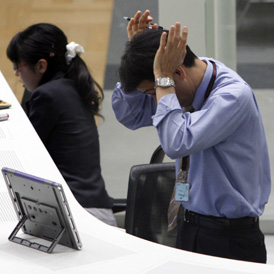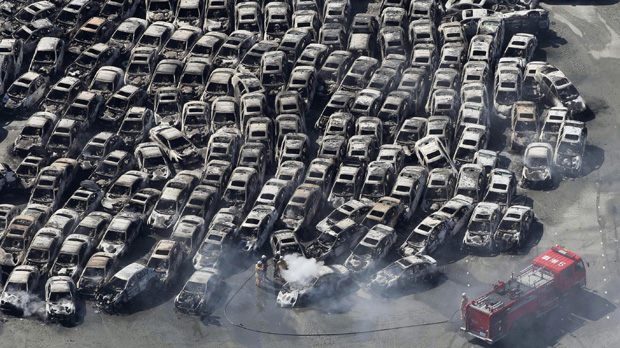Japan: hell on wheels as car giants bear brunt of disaster
A leading expert tells Channel 4 News that Japan’s car manufacturers will take the biggest hit from the tsunami – but reconstruction efforts will keep the wider economy on course for recovery.

Japan‘s automotive and electronics giants will be hardest hit by the series of disasters that have rocked the country in recent days, experts have told Channel 4 News.
But some academics are predicting that a boost for building firms when efforts to rebuild the shattered infrastructure of northeast Japan begin could tip the country’s beleaguered economy back into overall growth.
Tokyo’s Nikkei stock exchange closed down more than 6 per cent on Monday, the biggest fall since the height of the global financial crisis in 2008, following Friday’s earthquake, the devastating tsunami that followed and a series of explosions at the Fukushima nuclear power plant.
Car and electronics manufacturers were among the worst hit when trading resumed on Monday.
Shares in Toyota plunged almost 8 per cent after the company said it would suspend production at all its domestic car plants until at least 16 March.
Honda said its Japan plants would remain shut until 20 March while Nissan halted output at all its four domestic assembly factories and said it was unsure when it would be able to resume production.
The cars that have literally been washed away have to be replaced, and we will see electricity shortages in the short term. Dr Mark Manger, LSE
Fuji Heavy Industries said all five of its car and car parts-related plants for its Subaru-brand vehicles in Gunma prefecture, north of Tokyo, would be closed at least until 20 March.
Goldman Sachs said rough calculations indicated the profit impact of stopping production for one day would be about $73.3 billion (£45bn) for Toyota and $24.4 billion (£15m) billion yen for Honda and Nissan.
Panasonic said two of its factories in northern Japan have probably had their power and water supplies cut but continuing aftershocks mean inspections can’t be carried out.
Read more: Channel 4 News coverage in the Japan earthquake crisis

Sony has suspended operations in eight factories, four of which are in a serious condition, and Toshiba said production had been halted at a factory making chips used in microprocessors and image sensors.
Hiromichi Shirakawa, chief economist for Japan at Credit Suisse, said in a note to clients that the cost of the disaster could reach 15 trillion yen – the equivalent of $183 billion or £113 billion – in the quake region alone.
Dr Mark Manger of the London School of Economics told Channel 4 News that whoever picks up that bill – private insurance companies or the Japanese government – the massive cost of reconstruction could trigger an extraordinary turnaround in the fortunes of Japan’s debt-ridden economy.
Construction companies were the Nikkei’s biggest winners, with shares in Kajima Corp jumping 22.2 per cent and Taiheiyo Cement climbing 21.2 per cent.
Dr Manger said: “The car industry is not going to gain anything. The cars that have literally been washed away by the tsunami have to be replaced, and we will see electricity shortages in the short term.
“The immediate impact is that the major car manufacturers – the household names – are not going to be able to restart production for about a week or so.
In the long term, the construction industry is going to benefit from this enormously. Construction companies’ stock has jumped by 20 per cent. Dr Mark Manger, LSE
“The electricity shortages appear to be less than initially feared, probably because, if the Japanese government tells people to switch off their appliances to save power, they will pretty much do as they are told.
“But the area that’s been affected by the earthquake is a major source of automotive parts which will now not reach the factories elsewhere.”
“In the long term, the construction industry is going to benefit from this enormously. Construction companies’ stock has jumped by 20 per cent.
“It’s a redistribution and probably overall it will give a bit of a boost to the economy.”
Fellow LSE academic Professor Janet Hunter sounded a more cautious note, saying: “At the moment we don’t even know how much it’s going to cost or how many people have died.
“Clearly in the short term it will be hugely problematic. My view is that, providing that they can cope over the next few weeks and assuming that the nuclear stuff doesn’t get seriously worse, there is the potential for it to be more stimulating.
“The reconstruction effort will be quite positive. If there is a lot of money going into reconstruction, it could encourage people to spend money rather than save it.”
Minute-by-minute updates - Channel 4 News Japan crisis live blog
The Bank of Japan pumped 15 trillion yen ($183bn or £113bn) into the banking system on Monday in an attempt to boost liquidity. With debt already running at 200 per cent of GDP, could that kind of spending damage Japan’s credit rating?
Professor Hunter said: “Most of the debt is held domestically, by Japanese banks and savers, so it’s not subject to international speculation and things like that.
“International concern over the Japanese debt is not as big as you might expect.”
Credit ratings agencies Moody’s and Standard & Poor’s have said they do not anticipate changing their stances on Japan as a result of the disasters.
But some analysts think the effects of the earthquake could at least slow the Japanese economy’s slow emergence from recession.
Many economists had predicted that the world’s third largest economy would return to growth in the April to June period, but financial services giant Nomura is now predicting that the recovery won’t begin until the third or fourth quarter.
Nomura analysts Takahide Kiuchi and Okazaki Kohei said in a note to clients: “We now expect the Japanese economy to take longer than we expected to exit its current soft patch owing to the earthquake and tsunami.”
-
Latest news
-
‘I violated my moral compass working for Trump,’ former lawyer testifies3m

-
Working class creatives in film and TV at lowest level in decade5m

-
Israeli police investigating attack on Gaza aid convoy4m

-
Biden announces major tariff increase on Chinese-imported green tech3m

-
‘If NHS can afford it, people with obesity should have Semaglutide,’ says weight loss expert5m

-




